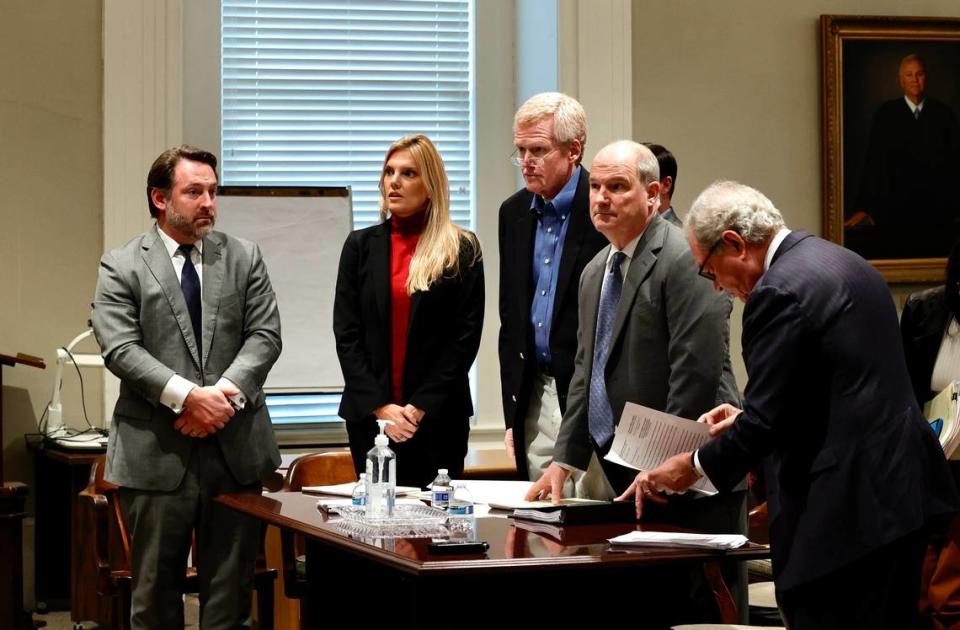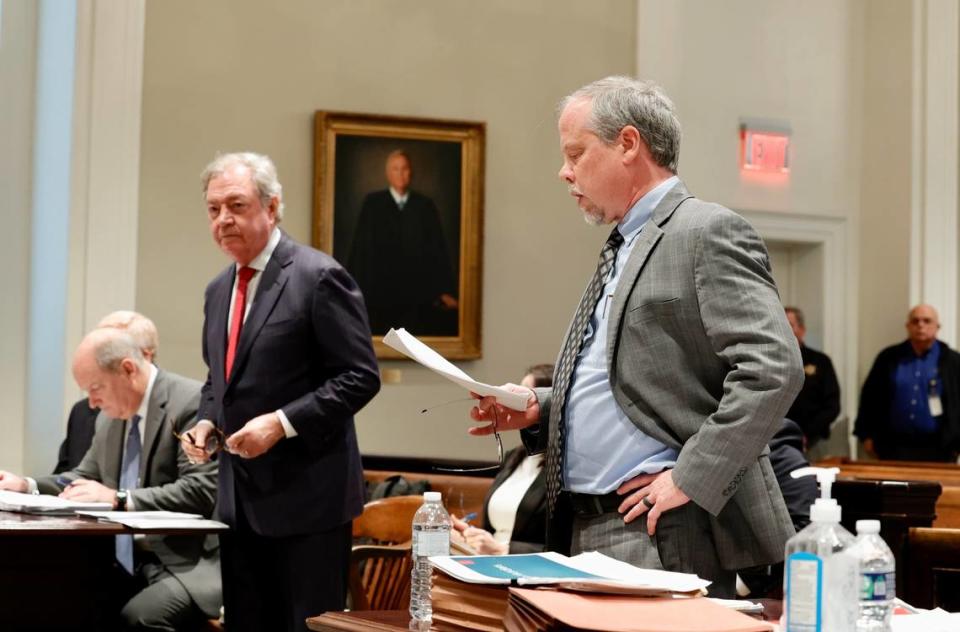Murdaugh’s alleged motive, blood spatter emerge as key disputed issues in upcoming SC trial
Lawyers on Friday battled over two unresolved issues in Alex Murdaugh’s upcoming murder trial: what his motive may have been for allegedly killing his wife and son and whether blood spatter evidence can be shown to the jury.
But Judge Clifton Newman did make two decisions Friday during a 90-minute hearing.
First, he said he will order that an oil painting of Murdaugh’s legendary prosecutor grandfather, Buster Murdaugh, be removed from the back wall of the Colleton County courtroom where his grandson’s double murder trial will take place, starting Jan. 23.
The late Murdaugh was a 14th Judicial Circuit prosecutor for nearly 50 years. Colleton County is in that five-county circuit.
And second, Newman ordered prosecutors to turn over to the defense all relevant information on blood spatter on a T-shirt Murdaugh wore the night of the killings, including information as to why a potential prosecution expert witness who studied the spatter might have changed his mind about the findings.
Spatter is crucial to the prosecution case because they have theorized that microscopic blowback from the killer’s close-range shotgun blasts to Paul Murdaugh would have been detectable on the assailant’s shirt.
The expert first said there was no spatter, but later changed his mind, Murdaugh’s attorney, Dick Harpootlian, said Friday.
“We believe that whoever shot Paul Murdaugh — basically blew his head off — would be covered with blood, not just spattered,” Harpootlian said, adding Murdaugh’s T-shirt showed no such blood drenching.
On Friday, Newman said he wants to study briefs from prosecutors and defense attorneys on Murdaugh’s motive before making a decision.
Murdaugh, in court Friday, was seen with his hair grown out, and he was sporting a navy blazer, khaki pants and a blue dress shirt without a tie. Previously, he had appeared shackled, in jail clothes and with a shaved head.
At the request of defense attorneys, Newman ordered that he be unshackled, a nod to the presumption that all persons charged with a crime are innocent until proven guilty.

Blood spatter evidence
Murdaugh is charged with murder in the shooting deaths of his wife, Maggie, and youngest son, Paul, the night of June 7, 2021, on the family’s 1,700-acre Colleton County property.
He has pleaded not guilty to those charges.
Murdaugh’s lawyers argued Friday that evidence purportedly showing blood spatter on Murdaugh’s T-shirt may be faulty, alleging damage had been done to shirt after state law enforcement chemically tested the shirt.
“It’s been ruined for forensic purposes,” Harpootlian said. “Whatever chemical treatment they put on it, they did wrong.”
Especially questionable, Harpootlian said, is the apparent changed testimony of state expert witness Tom Bevel.
Bevel is a retired Oklahoma police captain who first told South Carolina law enforcement there was no spatter but then after a visit from State Law Enforcement Division agents, changed his testimony, Harpootlian said.
Harpootlian also said defense attorneys want to interview Bevel and SLED agents under oath before making a decision on whether to file a motion to exclude the shirt from evidence in the upcoming trial.
“We need that information in order to say whether or not that’s voodoo science,” Harpootlian told the judge, citing incorrect information allegedly given by Bevel in a previous murder trial in another state.
In response, prosecutor Creighton Waters said the state’s handling of evidence concerning the shirt is “an open book process,” and he is glad to share prosecutors’ findings and paperwork behind those findings.
Waters said the SLED agents who visited Bevel with the T-shirt in question did so in person because the shirt is such a crucial piece of evidence, Waters said.
Prosecutors are still studying the evidence, said Waters, a lead criminal prosecutor with the state Attorney General’s office.

Murdaugh’s motive
Both Waters and Jim Griffin, Murdaugh’s defense attorney, gave impassioned pleas Friday to Newman about what evidence concerning motive should or should not go before the jury.
Newman made no decision but said he expects to receive written briefs from both sides on the issue before Christmas.
Prosecutors said presenting details about Murdaugh’s motive is central to the state’s case, which has attracted national and world attention for its unique mix of murder, financial crimes and the downfall of a powerful Lowcountry legal and political dynasty.
But defense lawyers have argued in court that they want to keep prosecution evidence about motive from the jury so they can argue there was no logical reason for Murdaugh to commit such an inhuman act as to kill his wife and son on their rural 1,700-acre property with high-powered weapons.
On the other hand, Waters said jurors won’t be able to understand a man’s decision to kill his wife and son without knowing about Murdaugh’s 20 years of a hidden life of an unending “hamster wheel” of secret escalating debts and thefts.
“Motive might be the most important fact that any juror would want to know,” Waters told the judge. “A jury will have to understand there was a huge difference in who Alex Murdaugh professed to be to the outside world, and how important that was to him as the central figure in this prominent family, and who he really was, and only he knew.”
For years, Waters said, Murdaugh relied on avoiding all accountability as he secretly stole almost $9 million from friends, law partners and others.
“When this case started, a lot of people assumed this was a murder case, and then a couple of months later, some white-collar fraud thrown in there,” Waters said. “But what we have realized is that this is a while-collar case that culminated in two murders. This is an unbroken chain of lying misappropriations and thefts.”
The financial crimes began when Murdaugh ended up underwater on some land deals in 2008, according to Waters. After that, Waters argued that Murdaugh found himself on a never ending spree, stealing from clients and his firm to maintain a lifestyle and pay off money he borrowed from friends and family.
In court, Waters said that they had evidence that Murdaugh stole money from clients every year from 2011 to 2021.
But June 7, 2021, was “a day of reckoning” for Murdaugh, Waters said.
That morning Murdaugh was confronted at his law firm by the bookkeeper, who wanted to know why he had not turned over a $792,000 fee from a lawsuit he had won with a lawyer outside the firm. That night, Murdaugh called 911 to report the deaths of his wife and son.
Meanwhile, other pressures were starting to build that would have exposed his life of lies, Waters said. And by killing his wife and son, he bought himself sympathy and time to avoid investigations into his wrongdoing, Waters said.
Murdaugh was “a man who had never faced accountability in his life,” Waters said, arguing that Murdaugh’s desperate need to distract from discovery of his financial crimes drove him to commit two murders.
Ample legal precedents have allowed for such evidence about motive to be introduced in South Carolina murder trials, Waters argued.
Griffin brushed the motive allegations aside, telling the judge that the only legitimate reasons allowed into court for killing such close family members were to eliminate a witness to a crime or to collect a financial windfall from life insurance.
And neither Paul nor Maggie knew anything about Murdaugh’s alleged crimes, and neither had any life insurance, Griffin said.
Speaking to widely-aired rumors about the case, Griffin said Maggie was not seeking a divorce from Murdaugh, nor had she requested an accountant to review his finances.
Waters’ bid to put motive evidence before the jury doesn’t meet the “acid test” of being relevant, Griffin said.

